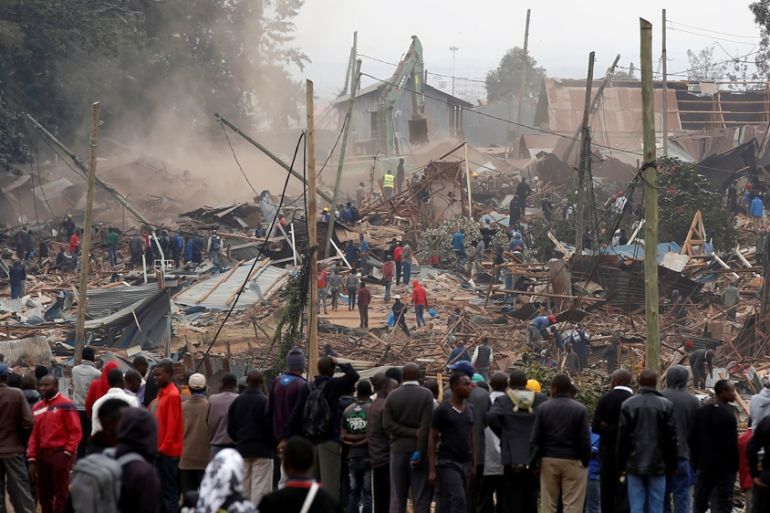Kenya: Kibera demolitions leave thousands homeless
Residents and activists say the government has gone back on promises to offer compensation and delay school demolitions.

Thousands of people in Kenya‘s largest slum are now homeless after two days of demolitions by a government body that human rights activists are calling a “violation of the law”.
The Kenya Urban Roads Authority (KURA) demolished buildings in Kibera on Monday and Tuesday as part of a project designed to relieve traffic congestion in the Kenyan capital, Nairobi, by building a highway through part of the slum.
Keep reading
list of 4 itemsPalestinian Prisoner’s Day: How many are still in Israeli detention?
‘Mama we’re dying’: Only able to hear her kids in Gaza in their final days
Europe pledges to boost aid to Sudan on unwelcome war anniversary
The destroyed buildings included homes, schools, churches and clinics.
The Kenya National Commission on Human Rights (KNCHR) called the forced evictions “not only a violation of the law and human rights, but also an unfortunate breach of trust and bad faith by the Kenya Urban Roads Authority and other concerned agencies”.
In a statement released on Tuesday, KNCHR says it is “particularly disappointed that the evictions are happening despite assurances from KURA that no evictions would be effected before completion and implementation of the ongoing enumeration and relocation of the Project Affected Persons.”
On July 10, KNCHR met KURA, the National Land Commission (NLC) and civil society groups to develop a resettlement framework for the Kibera residents being evicted.
They agreed that KURA would evaluate the properties being destroyed and provide the evicted residents with some form of compensation, with KNCHR and the NLC observing the enumerations to ensure fairness.
Press Release pic.twitter.com/CyN5ti8Mj4
— Kenya Urban Roads Authority (KURA) (@KURAroads) July 23, 2018
KURA released a statement on Friday saying it had completed enumerations for 2,000 households in Kibera and that residents should leave their homes over the weekend.
But residents say they have not received any form of compensation.
“That means KURA did not keep their word,” said Madina Mohamed, a spokeswoman from the Kibera member of parliament’s office.
“At the same meeting, we had also agreed that all affected schools will be spared until end of this term, which is at the end of July. When they started demolishing yesterday even the schools were not spared,” she told Al Jazeera on Tuesday.
Al Jazeera contacted KURA for comment, but did not receive a response by time of publication.
‘They’ll never compensate us now’
Seven schools were demolished this week for the impending road construction.
KURA said in a statement on July 10 that it has discussed the school issue with parents to “sensitise” them on “how they can help relocate [students] to nearby schools”.
But some community representatives say that’s not enough.
“I was in the meeting with KURA officials earlier this month and I feel betrayed,” said Ben Ooko, the director of Amani Kibera, a community organisation that teaches young people conflict management and health awareness.
“I believe they did the enumerations just to fool people. I don’t feel they’ll ever compensate us now,” he told Al Jazeera.
Amani Kibera’s resource centre was among the buildings demolished on Monday. It included a daycare, a fashion school for girls and community library.
As the thousands of evicted residents – rights groups put the figure to at least 10,000 people – wait to see if they’ll be compensated, they’re also struggling to find somewhere to live.
“Some of the tenants spent their night in cold, those who were able to move upcountry last night. There are also others who are moving around looking for cheaper houses,” said 25-year-old Vincent Omondi, who was born in the area that has now been flattened.
“Apart from the houses, schools, churches and hospitals have also been demolished. Our church was also in the way.
“The sad thing is that poor church members raised funds to buy the plot and it was even approved by the government authorities of that time,” he told Al Jazeera.